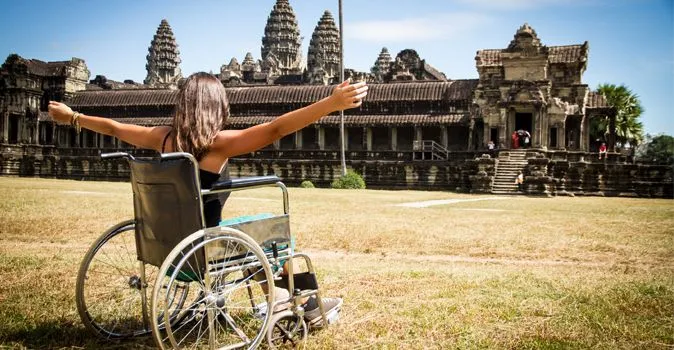
Would you be surprised to learn that Machu Picchu is accessible? That you can paddleboard in a wheelchair? Or that ancient Tibetan Temples are now outfitted with wheelchair ramps?
I love traveling. My passport is scarred and bruised from random abuses, yet each blemish tells a unique and often funny story! But two years ago after a near-fatal accident left me with permanent injuries, I sadly surmised my adventuring days were over.
Last summer I found myself assigned the task of planning an unavoidable business trip. I had to be in the South for 5 days, with 3-hour long meetings during three of them. This left me with quite a bit of downtime. Which isn’t bad in and of itself but when you’re a restless soul like @ArbitraryKitten you can’t just sit in your hotel room flipping channels, you need to be out and about! Yes, even with the inconveniences and pain of my medical conditions.
I predicted a physically draining week brimming with challenges and stress. Due to the bone damage in my lower vertebrae and the missing muscle surrounding them I sometimes have to walk with a cane, especially when I'll be on my feet for a while. And I suffer debilitating bouts of incapacitation from sciatica which leave me (loudly vocalizing!) in agony. Sciatica is a wickedly ugly monster, attacking you at any time without provocation or warning, to literally knock you off your feet and leave you unable to walk for a time afterward. Someone with my injuries such as these should ideally travel with a wheelchair, however, this is not an option for me at this point.
I would be far from the conveniences of home, my Doctor, and my family and support network of friends. What if something went wrong? I’d be in an unfamiliar area with little to no resources. It was stressful just thinking about it!
But something my Grandpa used to tell me popped in my head: Don’t worry about the potholes in the road, just enjoy the journey!
And you know what? I've faced things far scarier than this. And I not only survived: I thrived. I’m a pretty smart cookie, damnit! No way I was going to let this beat me.
I decided that advance research and planning would be my best strategy, so I made a list and planned my attack of the South.
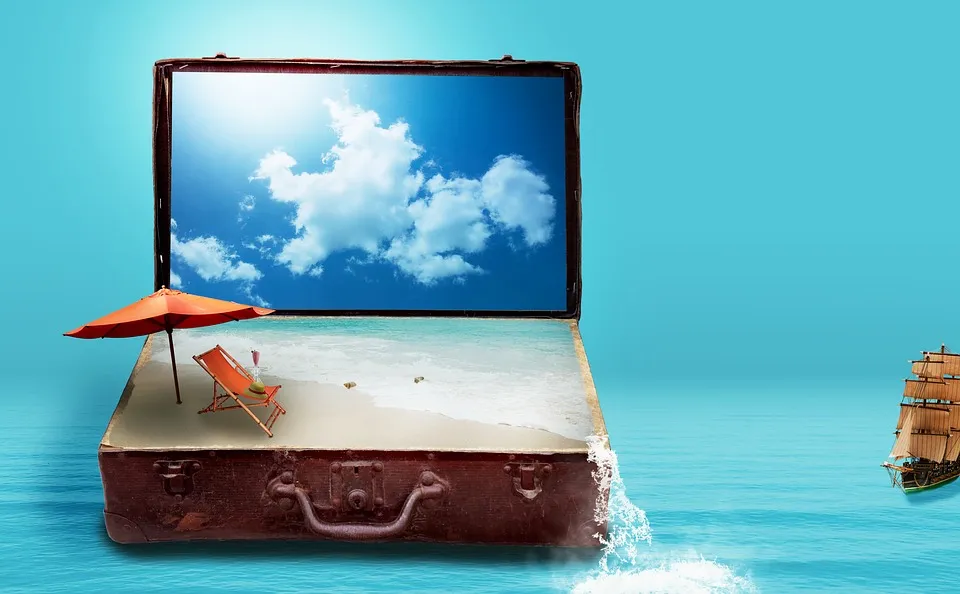
Remember, great things never come from comfort zones ;)
I’m sharing what I learned and how I mastered the art of traveling with physical limitations so you too can enjoy beautifully uncomplicated and memorably fun travels.
PLAN
Planning is your # 1 most important element in ensuring ease and a stress-less trip. I researched and contacted anything and anyone I could think of. And many times it’s not enough to look it up online, often the best approach is to make a phone call.
Begin by answering these questions:
- How will I get there?
- How should I get around while there?
- What will make the trip easier for me and anyone traveling with me?
- What is my primary and secondary goal for this trip?
- How can my accommodations and mode of transportation help me get the most out of my journey?
- What can I take from my daily life to make me most comfortable during this trip?
Make a list of everywhere you will go and everything you will need while there. Include restaurants, souvenir shops, events and sightseeing locales; anywhere you anticipate visiting. Investigate accessibility, services, times, and costs. Ask questions relevant to your particular situation, and don't forget this very important question:
Is there anything else you can think of that I should know/see/do/prepare for? ~ You'll find this question invaluable in many circumstances in your life!
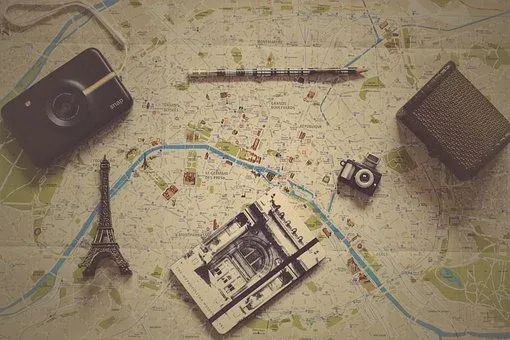
If you use a wheelchair, decide whether to bring yours or rent one at your destination. By renting a scooter or wheelchair you'll save time at the airport, and it will be delivered directly to your hotel room or cruise ship cabin.
The more research and planning you do, the more accessible your trip will be and the more fun you will have. Start planning as soon as you can, preferably 4-6 weeks before.
FLYING
There are a number of tips and tricks for injured and disabled persons that nobody tells you about airports and planes- I had to find them out through experience. 8 flights and 6 airports of experience ;)
PACKING
I chose to bring just a carry-on and personal item, not wanting the extra hassle (and expense) of checked baggage. But whichever is your preference be sure to put some thought into what you're bringing.
For both airlines I flew with, I was allowed a carry-on the size of a medium duffle or suitcase plus one "personal item" which can be a large purse or bag or laptop-type case. Your carry-on must fit in the overhead bins. I chose a large bag as my personal item and that had to fit under the seat in front of me.
I packed my clothes and shoes in my carry-on duffel. I placed my personal entertainment (book, tablet, headphones), medications, wallet, phone and charger, jewelry, keys, sunglasses, and snacks in my bag for easy access.
- Check the luggage size restrictions with your airline before you pack.
- Check TSA.gov for liquid limitations. Currently, all liquids, creams and gels must fit in a quart size ziplock bag, with each one in a travel sized container weighing 3.4 ounces or less. I also check again the day before my flight, just in case.
- Wheels are your best friend! If your luggage doesn't already have wheels, you can add detachable wheels to your duffel or find a Travelcart (small handcart or caddy on wheels for your bags.)
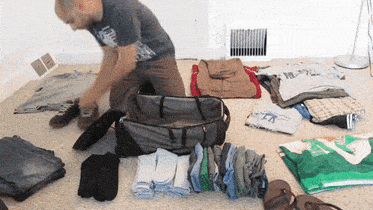
- Pack light if possible.
- Roll your clothes instead of folding- it's an amazing space saver! There are many videos on YouTube showing how.
- Conduct a test run of your luggage. Lift it over your head, carry it, walk with it, etc. Make sure you can easily handle it and didn't pack too much!
TSA SECURITY
When you arrive at the airport politely inform an agent or airline personnel of your injury/disability. They have dedicated staff to assist you, and will even provide you with a wheelchair if you need and escort you through security all the way to your gate. After your flight(s) they even escort you to your shuttle or car rental service. There is no charge for this service.
The wheelchair escort is super handy if your connecting gate is far or your time to get to your next gate is short. I do not use a wheelchair at home but I took advantage of the service on my Seattle to Memphis flight with a plane-change in Denver.
Denver airport is extremely large. My connecting flight was literally OVER HALF A MILE away! The times on my ticket stated I only had 15 minutes to get there-sometimes it takes 15 minutes just to de-plane! Luckily, when I'd entered my first airport, SEA-TAC, an agent had seen my cane and offered the wheelchair, which alerted each connecting flight to have a wheelchair escort waiting to transport me to my next flight.
I never would have made that connecting flight had I not had the escort, who literally ran me so I wouldn't miss it!
You can also call the airline a day or two before your flight and they'll have an employee meet you curbside.
Avoid connecting flights is possible.
TSA does not want injured or disabled passengers standing in line, which is why you initially found that agent. You will be sent/brought to the front of a line and screened immediately.
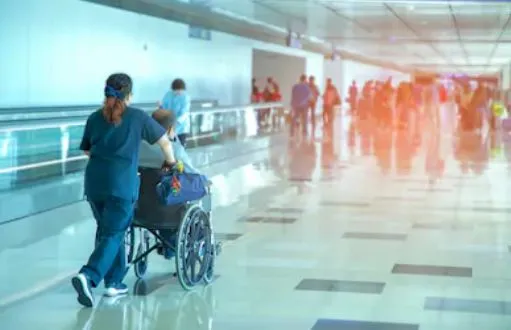
Consider purchasing TSA Pre-Check if you travel often. It's $85 for a 5 year membership (at the time of this posting) allowing you to speed through security. And you won't need to remove your shoes, liquids, belt or laptops. See TSA.gov for info.
Most airlines will send you a text or email allowing you to "check-in" online 24 hours before your flight's scheduled departure. This prevents you from having to visit the counter and will warn of any delays at the airport. It takes only minutes and saves time.
If you need help, ask. These agents and personnel are here for you and because of you. They receive a paycheck because you purchased their services. Do not feel you are putting someone out- remember that they are there for you.
Car Rental or Public Transportation
If you will be using public transportation (bus, taxi, subway, rickshaw, Uber, Lyft, etc) contact their services and find out everything you will need to know: prices, times of availability, accessibility, and routes. Take notes, including a 24 hour phone number you may call in case of emergency. Print route maps in case you encounter areas of poor cell service.
Consider your specific needs, including how much time you will spend in it, when choosing a rental vehicle.
If you rent your vehicle via website or app, call the office at your destination 48 hours before your scheduled flight to ensure the specific vehicle you require will be available.
Think of how you use your personal vehicle and plan accordingly. For instance, not all rentals have a GPS system. If you'd be lost without Google Maps, consider packing your dash mount or vent phone holster. It'll come in handy, especially if you have no idea how to read a map!

Set up the vehicle for your comfort before you drive away. I don't know how many times I remember to bluetooth connect my phone for handsfree use after I'm on the road already! Or have to fish around for the wipers during a sudden downpour! How about something as silly as having to pull over just to figure out which knob turns on the headlights after dark? Two minutes is all it takes to familiarize yourself with your rental car.
Ask for a paper map before you leave, your rental agent will provide one for free. Technology can and does fail.
Hotel
Book in advance. Most hotels only have one or two accessible rooms.
Call before reserving your hotel. Many sites have outdated or even misleading information, and the worst time to find out is when you're at the registration desk.
Call for further information even when it says "accessible". If you use a wheelchair, ask for the dimensions of the doors- you'd be surprised at how many clients hotels have to turn away because their doors aren't wide enough.
If your disability is invisible, ask the hotel for a room by the pool. It will be ground level and usually beside the office.
Sightseeing, Events, and the Fun Stuff
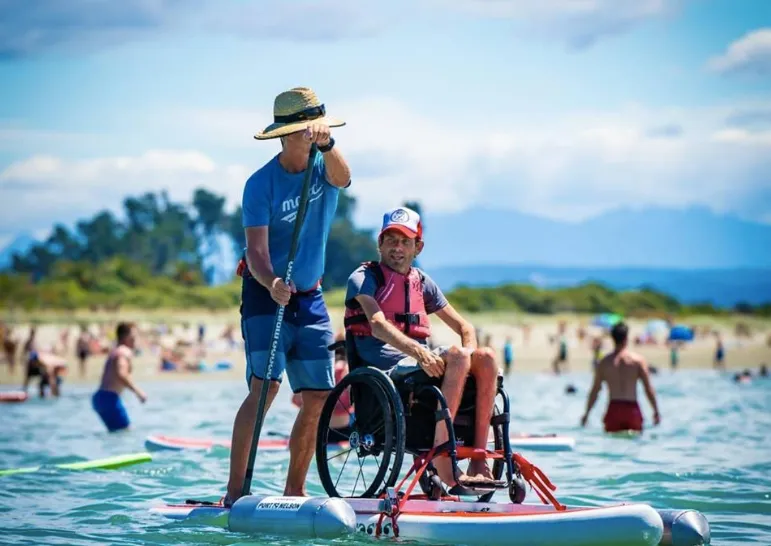
When doing your pre-trip research, contact the Chamber of Conference Tourist Center. Staffed by retired life-long residents, they know the area quite well so are a wealth of information. They will recommend things to do based on your criteria- tell them that you are on a budget and have 5 hours on Saturday afternoon, and need something that involves little walking and they will present you with options, and even circle them on a map and give you coupons.
Have more than a little time? Consider a tour guide or travel agent. They'll offer an array of itineraries tailor-made for physically limited travelers and are outfitted to accommodate your needs.
A Few More Tips
Be specific and detailed when describing a disability. Not everyone knows the "PC" terms (or even medical terms) for conditions, so it's up to you to be clear and describe your physical limitations, what you can and cannot do, and your specific wants and needs. Do not downplay.
Be clear and detailed when describing your trip to your doctor. They can often prescribe measures to deal with long flights or limited medical facilities.
Ask your doctor for extra prescriptions and bring extra medication, just in case. Delays happen. Natural events happen. Having an extra month of medication is priceless. Store all medication and necessary medical supplies in your carry on.
Keep a statement from your doctor on letterhead in your wallet. It should have their contact info- including a number to be reached at any time of day, and detail your condition, allergies, medications and any special needs or important information.
Scheduling for more time at each leg of your journey will give you a buffer in case of any mishaps, and prevent much stress.
Traveling is one of the best ways to refresh and recharge your soul. Whether you are making an unavoidable trip for work with an injury or not letting a physical limitation stop you from a dream vacation, a little advance preparation will ensure smooth sailing.
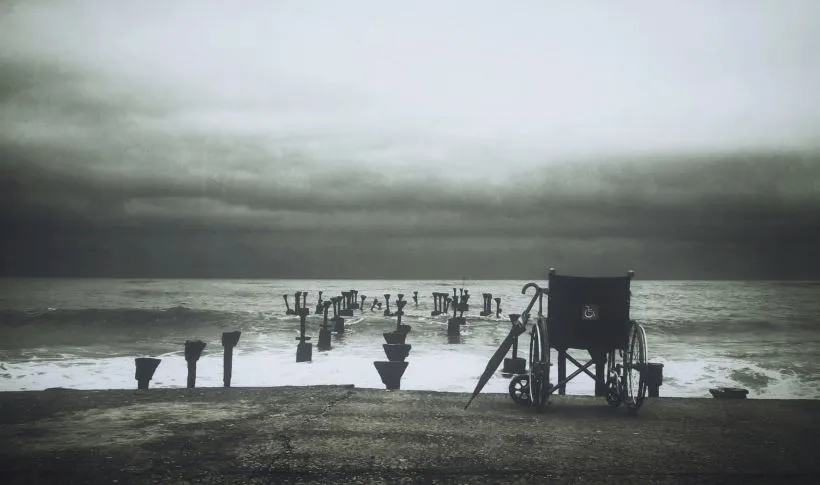
Knowledge is power. The salt flats of Bolivia are on my bucket list. Now that I am armed with an arsenal of information, I am confident that I will have an amazing time.
In fact, I am planning that trip right now :)
Have you traveled with an injury or disability or accompanied a loved one? I'd love to hear about it! Please share your experience in the comments!
Also, please leave a comment if you have questions on anything I haven't covered here :)
fear is only temporary, regrets last forever

Steemit works because of you.
You have the power to determine the success of your peers and create an informative and entertaining community. If you enjoyed this article chances are your friends will too! Resteem to share it with your fans, and follow for more great and informative posts!
I love your comments! Share your thoughts and questions below.
Your support is appreciated

Images via my Sony a330, LG & Samsung Galaxy Android, Pexels, Pixabay, & Creative Commons.




In proud collaboration with the following stellar communities:




If you find this article after 7 days, please consider upvoting a recent article
